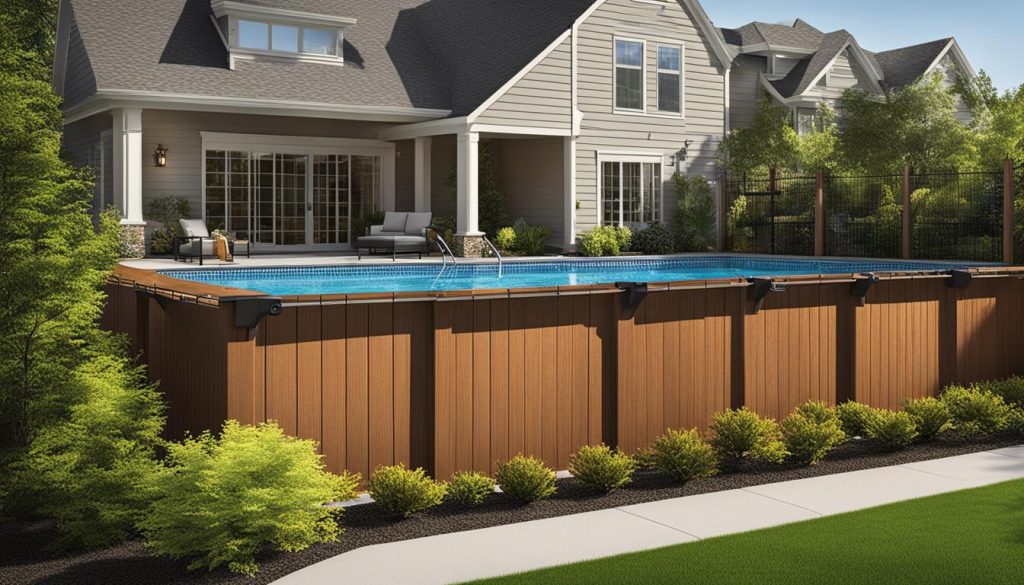Welcome to our comprehensive guide on pool safety measures. With summer right around the corner, many of us are eagerly anticipating the arrival of pool season. But with great fun comes great responsibility – it’s crucial to keep our residential pools secure to prevent accidents and ensure everyone can enjoy the water safely.
At Pool Designers, our top priority is always safety. We’ve compiled a detailed rundown of essential pool safety measures to help you keep your residential pool secure. From understanding the risks of pool accidents to establishing pool rules and supervision, we’ve got you covered.
By implementing these tips, you can enjoy a worry-free and safe pool time with your loved ones this summer. So let’s dive in and explore the world of pool safety together!
Understanding the Risks of Pool Accidents
Before we dive into the essential pool safety measures, it’s essential to understand the risks associated with pool accidents. According to the Canadian Red Cross, an average of 166 people dies from drowning in Canada annually, with 57% of these accidents occurring in swimming pools. Children and non-swimmers are particularly vulnerable to these accidents.
The following are the common causes of pool accidents:
| Cause | Description |
|---|---|
| Unsupervised swimming | Swimming without proper adult supervision is a significant cause of pool accidents, primarily for young children. Accidents can happen in a matter of seconds even in shallow waters, so constant supervision is crucial. |
| Improper barriers | Barriers such as pool fences, safety covers, and nets are essential in preventing unauthorized access to the pool. Without these barriers, children and pets can easily wander into the water and accidentally fall in. |
| Lack of swimming ability | Non-swimmers are at a higher risk of drowning than experienced swimmers. All swimmers should ensure they have adequate swimming skills before swimming in a pool. |
| Alcohol consumption | Drinking alcohol before and during pool activities can impair judgment and coordination, increasing the risk of accidents. |
| Failure to follow rules | Rules such as no running, no diving in shallow waters, and no horseplay are essential in preventing accidents. Failure to follow these rules can lead to severe injuries and accidents. |
It’s crucial to note that accidents can happen to even the most experienced swimmers, and it’s important to stay vigilant and take necessary precautions to prevent accidents from happening.
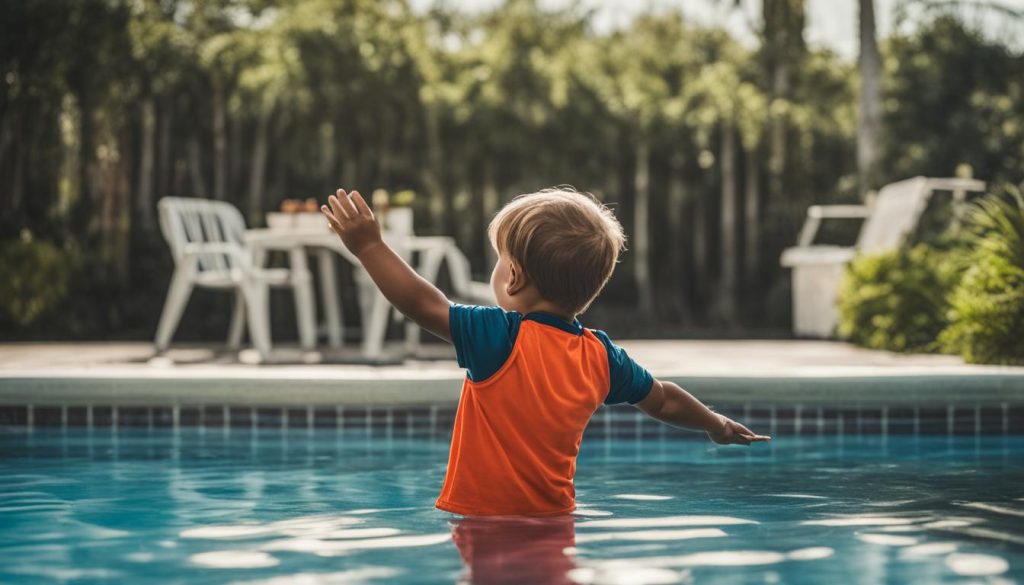
Pool Safety Equipment and Devices
When it comes to ensuring pool safety, having the right equipment and devices in place is crucial. Here are some options to consider:
| Equipment/Device | Description |
|---|---|
| Pool Covers | A solid safety cover can be an effective barrier to prevent accidental submersion. These covers are installed over the pool and can support the weight of an adult. |
| Pool Alarms | Pool alarms detect movement in the water and can alert you when someone enters the pool. |
| Pool Fences | A pool fence provides an additional layer of protection, particularly when children are around. The fence should be at least four feet high with a self-latching gate. |
| Safety Nets | Safety nets are similar to covers, but they use netting instead of solid material. They are also an effective barrier to prevent accidental submersion. |
It’s important to note that these devices and equipment should not replace adult supervision. They are additional precautions to take to ensure that your pool remains secure.
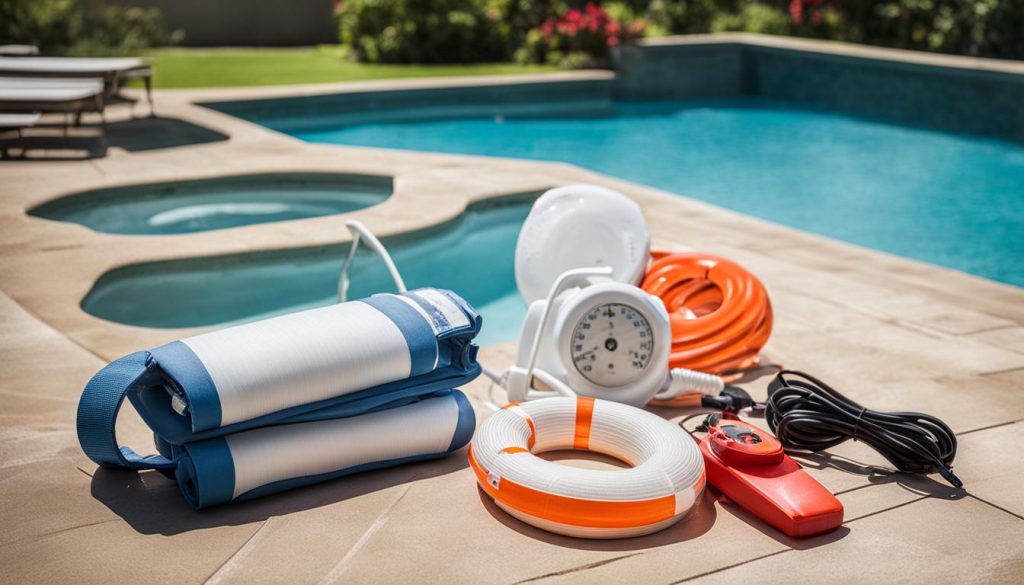
Pool Covers
Pool covers come in various materials, including vinyl, mesh, and solid. A solid cover is best suited for preventing accidental submersion. This cover type can support the weight of an adult and is designed to keep debris out of the pool when it’s not in use. Be sure to choose a cover that fits your pool correctly and install it properly to ensure it’s secure. You should also regularly inspect the cover for any tears or damage.
Pool Alarms
Pool alarms alert you when someone enters the water by detecting motion in the pool. They are relatively inexpensive and easy to install. There are various types of alarms, including floating alarms, gate alarms, and door alarms. Be sure to choose an alarm that suits your specific needs and preferences.
Pool Fences
A fence is one of the most effective ways to secure a residential pool, particularly when children are around. The fence should be at least four feet high and have a self-latching gate. The fence should also be climb-resistant, with no openings or footholds that children could use to climb over. If you have an above-ground pool, you can also install a fence or deck that provides a barrier around the pool.
Safety Nets
Safety nets are an alternative to pool covers and can be just as effective in preventing accidental submersion. The netting is stretched over the pool and fastened to hooks installed around the pool’s perimeter. Safety nets are durable and can support the weight of an adult. It’s important to note that safety nets are not designed to keep debris out of the pool.
By investing in these pool safety equipment and devices, you can significantly enhance the security of your residential pool. Remember, however, that adult supervision remains the most crucial aspect of pool safety.
Establishing Pool Rules and Supervision
Ensuring proper pool rules and supervision is key to preventing accidents and keeping your loved ones safe. We recommend creating rules that are easy to understand and are enforced consistently. Here are some essential rules to consider:
| Rule | Description |
|---|---|
| No diving | Diving can lead to head and spinal injuries. It’s important to restrict diving in the shallow end of the pool. |
| No running | Running on wet surfaces around the pool can lead to slips, falls, and injuries. |
| No glass near the pool | Broken glass can cause injuries and create a safety hazard. Use plastic cups and containers instead. |
| No swimming alone | It’s important to always have a buddy while swimming. In case of an emergency, the other person can provide assistance and call for help. |
In addition to enforcing pool rules, it’s essential to have constant supervision, particularly when children are present. Adults should be responsible for watching children at all times and should avoid distractions such as using their phones or reading a book. For added safety, consider hiring a lifeguard or taking turns watching the pool. This can help ensure that supervision is always present, and accidents can be prevented.
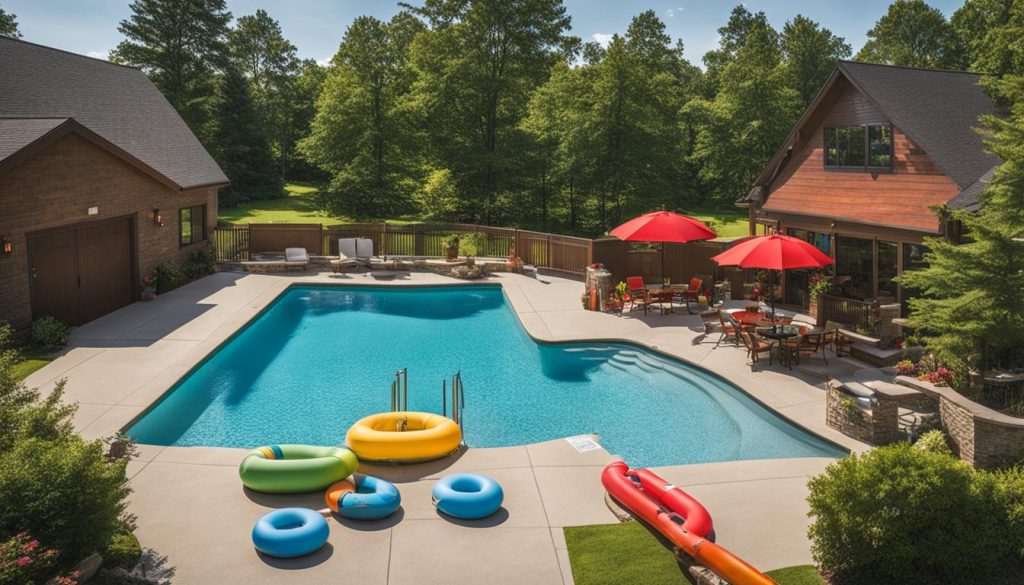
By establishing clear pool rules and maintaining proper supervision, you can significantly reduce the risk of accidents and ensure a safe and enjoyable swimming experience for all.
Safety Measures for Pool Maintenance
Regular pool maintenance is essential for keeping your pool clean, healthy, and safe for swimming. However, pool maintenance tasks can pose potential hazards that can compromise pool safety. By following these pool maintenance safety measures, you can ensure that pool maintenance is performed safely and effectively:
| Task | Safety Measures |
|---|---|
| Chemical Handling |
|
| Cleaning |
|
| Equipment Inspections and Repairs |
|
By following these pool maintenance safety measures, you can maintain a safe and healthy pool environment throughout the swimming season. Remember, proper pool maintenance is crucial for preventing accidents and ensuring that your loved ones can enjoy a worry-free and refreshing swim.
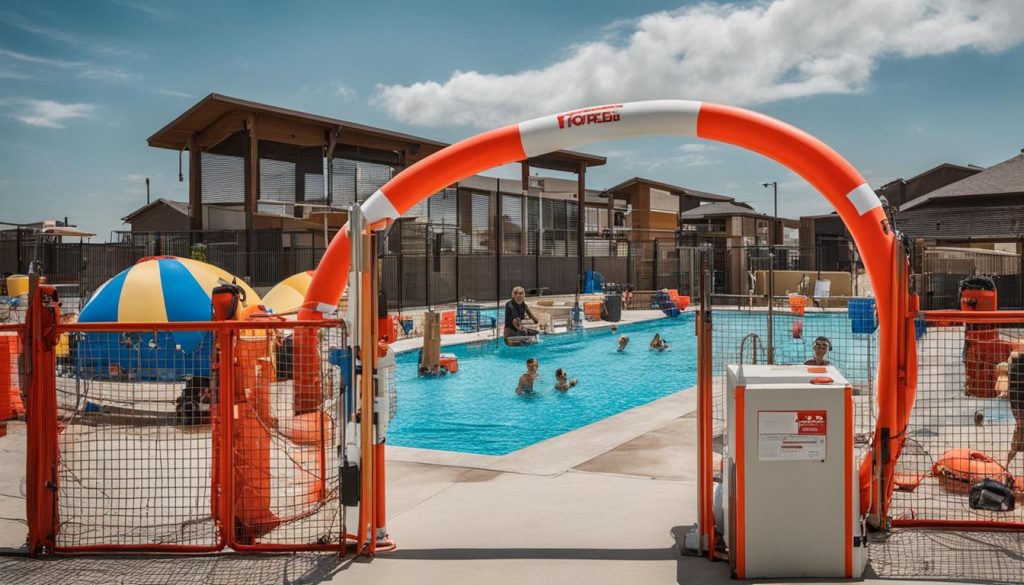
First Aid and Emergency Preparedness
Accidents can happen, no matter how cautious we are, which is why it’s essential to be prepared for emergencies. Having basic first aid and CPR knowledge can make a significant difference in the outcome of an incident. Here are some first aid and emergency preparedness measures to keep in mind:
| First Aid Tips | Emergency Preparedness |
|---|---|
| Pool-related injuries – Be ready to handle injuries such as cuts, bruises, and minor burns. Keep a first aid kit near the pool and familiarize yourself with basic first aid techniques. | Emergency numbers – Keep a list of emergency numbers such as 911, your local police department, and hospital near the pool area. Ensure everyone knows where to find it. |
| Drowning – If someone is drowning, call for help immediately and remove the person from the water. Begin CPR if necessary, and if possible, use an automated external defibrillator (AED). | Lightning safety – If there is a thunderstorm, everyone must exit the pool and seek shelter indoors. In case of lightning strikes, do not touch the person, and call for help immediately. |
| Chemical Exposure – Always handle pool chemicals with caution, follow the instructions on the label, and wear protective clothing and gloves. In case of chemical exposure, rinse the affected area with water and call for medical help. | Evacuation Plan – Establish an evacuation plan for emergencies, practice it regularly, and ensure everyone in the household knows what to do in case of an incident. |
It’s essential to refresh your first aid and CPR skills regularly. Consider taking a course to ensure that you are up-to-date with the latest techniques and recommendations.
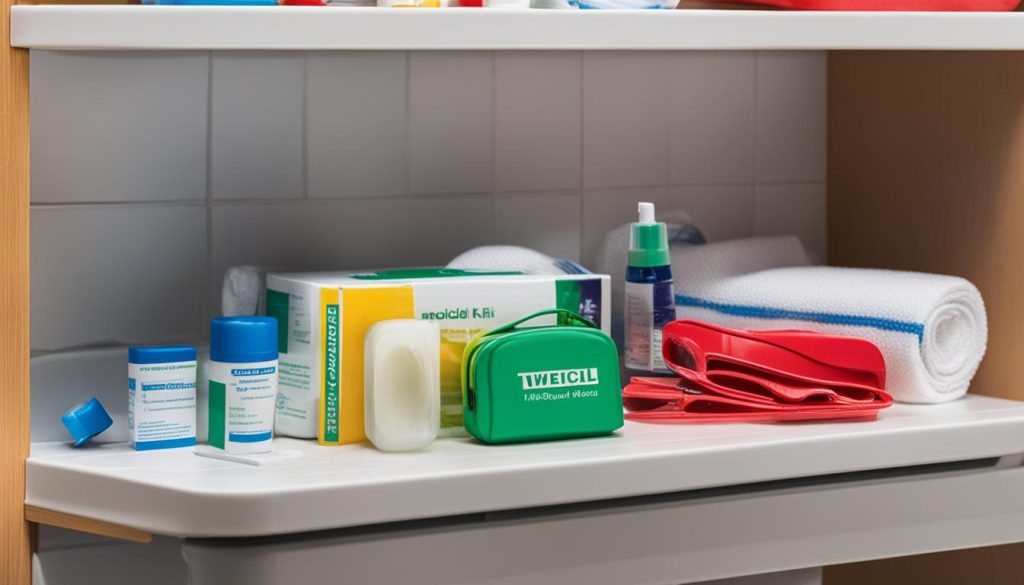
Importance of Regular Inspections and Maintenance
Regular inspections and maintenance are essential components of keeping your residential pool safe and secure. By identifying and addressing potential hazards early on, you can prevent accidents and ensure a worry-free swimming experience for you and your loved ones.
One of the first steps in maintaining pool safety is to conduct routine inspections. Regular inspections can help you identify issues such as cracks, leaks, and worn-out pool equipment, which can pose a safety risk. It is recommended that you conduct pool inspections at least once a month, especially during the swimming season.
Identifying Potential Hazards
During inspections, you should pay attention to the pool’s physical condition. Check for any damage to the pool’s walls, tiles, or decking material. Look for any cracks, chipping, or loose tiles that could cause injury. Ensure that the pool’s lighting is functioning correctly, especially during nighttime swims.
It is also essential to inspect all pool equipment, including filters, pumps, and heaters, to ensure they are in proper working order. Faulty equipment can lead to pool-related mishaps, and therefore it’s important to catch these issues before they escalate.
Maintenance Tips
In addition to inspections, regular maintenance is paramount to pool safety. Ensure that the pool is clean and free of debris, as unclean water can increase the risk of skin infections and illnesses. Maintain proper water levels, pH levels, and chemical balances as it promotes healthy pool chemistry.
It is recommended to hire a professional pool maintenance company to perform regular maintenance tasks such as cleaning, chemical treatments, and filter cleaning. Professional services can also assess the pool’s overall condition and make necessary repairs to ensure that your pool is always in optimal condition.
In conclusion, regular inspections and maintenance are critical components of keeping your residential pool safe and secure. By being proactive and identifying potential hazards early on, you can prevent accidents and ensure a worry-free swimming experience for you and your loved ones. So, make sure to schedule regular inspections and maintenance tasks to keep your pool in good condition throughout the swimming season.
FAQ
What are some essential pool safety measures for residential pools?
Some essential pool safety measures for residential pools include installing a pool fence, using a pool cover when the pool is not in use, installing pool alarms, and ensuring proper supervision when the pool is occupied.
What are the risks associated with pool accidents?
Pool accidents can result in drowning, near-drowning incidents, and injuries such as slips, trips, and falls. It is important to be aware of these risks and take appropriate measures to prevent accidents.
What types of pool safety equipment and devices can enhance the security of a residential pool?
Pool safety equipment and devices that can enhance the security of a residential pool include safety covers, pool alarms, pool fences, safety nets, and motion sensor lights. These measures help prevent unauthorized access and provide an added layer of protection.
What pool rules should be enforced to ensure safety?
Some important pool rules to enforce include no running or horseplay around the pool, no diving in shallow areas, and no swimming alone. It is also important to establish rules regarding the use of pool toys and equipment to avoid accidents.
What safety measures should be followed during pool maintenance?
During pool maintenance, it is important to wear appropriate protective gear, handle chemicals safely, and ensure proper ventilation in the pool area. Regular equipment inspections and cleaning procedures should also be followed to maintain a safe swimming environment.
How should emergencies related to pool accidents be handled?
In case of emergencies related to pool accidents, it is important to call for help immediately and remove the person from the water if safe to do so. Knowledge of CPR and first aid can be life-saving in such situations, so it is recommended to undergo proper training.
Why is regular inspection and maintenance important for a residential pool?
Regular inspection and maintenance are important to identify potential hazards such as damaged pool equipment, loose tiles, or worn-out pool covers. By addressing these issues promptly, you can ensure the safety and longevity of your residential pool.

